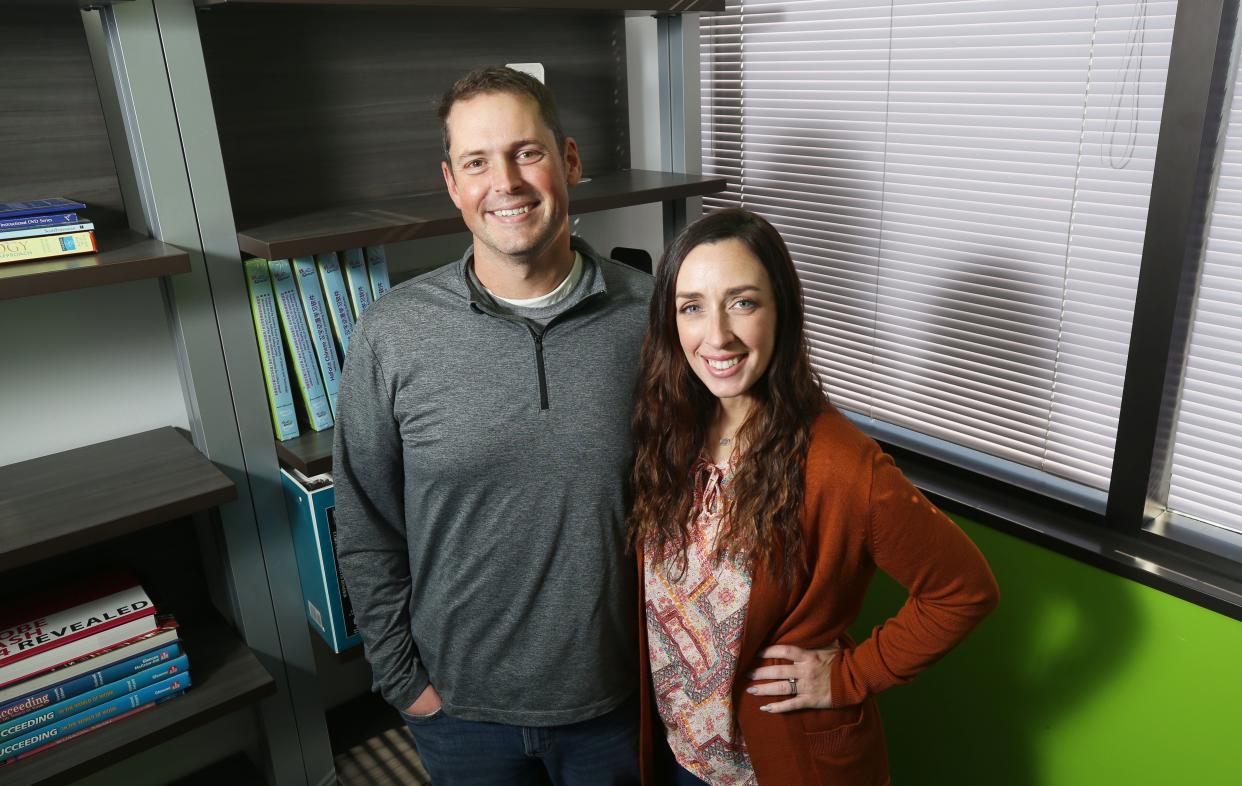Hilliard neighbors, colleagues drawn closer after kidney transplant

Kidney dialysis waits for nothing.
Not even a father and husband wanting to celebrate Easter Sunday with his wife and three children.
And so it was, Lydia Allen posted a picture of her husband, Scott Allen, on social media April 17, who was undergoing kidney dialysis, rather than being at home with his family.
Scott Allen's neighbor and fellow Hilliard City School District colleague saw that Allen's condition had worsened to the point a kidney transplant was needed to save his life.
“It was a picture of (Allen) with him and (his daughter) and it just hit home what he was missing,” said Amy Case, who made the decision to undergo screening to learn if she was a match as a living kidney donor for Allen.
She was.
The pair underwent surgery Sept. 2, three days before Labor Day, and Case’s kidney was successfully transplanted into Allen and both are to spend Christmastime each more aware than ever before of the fragility and preciousness of life.
Case, 40, is a special education coordinator for Hilliard City Schools and has been in the district 14 years.
Allen, 37, is a math teacher for the district’s online academy at the Innovative Learning Center.
Allen and Case met in 2010 at Hilliard Bradley High School, where Allen was then a math teacher.
The two learned they were also neighbors, residing on the same street in Hilliard’s Weston Trail subdivision.
In 2015, experiencing persistent headaches, Allen consulted the family physician and learned he had IgA nephropathy, also known as Berger’s disease, a condition in which an antibody known as immunoglobulin stores in the kidney, causing it to lose function.
By the time of the diagnosis, each of Allen's two kidneys were functioning at about 25 percent capacity, he said.
“It was a shock; I thought I was healthy,” said Allen, who, since that day in 2015, was aware that he would one day require a transplant to save his life.
But the condition progressed quicker than projected and by late 2019, Allen said he often felt too tired to enjoy activities with his family.
In early 2022, Allen was required to undergo four-hour sessions of kidney dialysis, three days a week.
“I felt a little better at first,” but the continuing kidney dialysis was only a run-up to the kidney transplant required to save his life, he said.
As his family searched for a donor, Case said she was reminded of a medical emergency her daughter experienced in 2020.
Her daughter has recovered but spent months in the hospital after learning she developed an affliction called acute motor sensory axonal neuropathy (AMSAN), a rare and severe variant of Guillain Barre Syndrome (GBS), causing muscle weakness, but for which there are successful treatments.
“That changed my view (and) I thought I would want someone to help me, or my child, if they could. What if (my husband) needed a kidney transplant? Who would step up? I wanted to be that person,” Case said.
After consulting with her own family, including her mother; husband, Brad; and their three children, Case said she began the screening to determine if she was a donor match.
Once it was ascertained that she was, the two families began planning.
Unlike when receiving a transplant from a donor upon death, in which case a recipient has but hours to prepare after receiving “the call,” recipients of living donors can plan and schedule the surgery, Allen said.
The surgery was Sept. 2 and Allen and Case both said they are recovering well.
“My body is still adjusting some (and) my energy levels are a little lower, but I’m told the remaining kidney, over the next year, will enlarge and I will eventually be at two-thirds of the capacity I would have with two kidneys," Case said.
Allen, who has three kidneys, said “I feel so much better, a million times better.”
Because his birth kidneys still provide some level of function, they were left in his body to augment the healthy kidney he received.
“I can play with my kids the same way I used to do.”
The Allen and Case families are also spending more time with each other.
Scott and Lydia Allen have three children, ages 8, 5 and 3; and Brad and Amy Case have three children, ranging in age from 4 to 11.
“There was so much I couldn’t do because I was tired. I couldn’t swim with my kids because of the dialysis port,” Allen said.
Since the transplant, Allen said he takes “nothing for granted” and enjoys “every day a little more than before.”
For Case, it is a vicarious experience to watch Allen enjoy time with his children the same way she learned to appreciate returning to normal activities with her daughter.
“It is great to see how well (Allen) is doing.”
“We were friends, of course, and co-workers before (the transplant), but we are a lot closer now, usually sharing things via group texts. We are like family now,” Case said.
Allen and Case both said they hope their experience will inspire others to be living donors.
@ThisWeekCorvo
This article originally appeared on ThisWeek: Hilliard neighbors, colleagues drawn closer after kidney transplant

